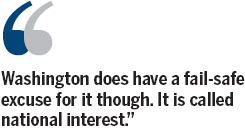After 'Occupy Teheran'
Updated: 2013-09-06 06:51
By Yang Sheng(HK Edition)
|
|||||||||
The American press reported that the United States could launch military strikes against Syria as early as this week in retaliation for using chemical weapons on anti-government guerrillas and the civilian population. It is ironic that Foreign Policy magazine carried an embarrassing story with exclusive interviews of officials involved and declassified CIA documents confirming that the US turned a blind eye on Iraq's use of nerve gas in its war against Iran in the 1980s, which not only thwarted the much larger Iranian Army but also killed many civilians. Iran at that time wanted to but could not complain to the United Nations over lack of evidence; while in fact the CIA knew all along that Iraq was producing chemical weapons and exactly how and when the latter transported chemical weapons to the war zone. The White House was regularly briefed about the scale of Iraqi chemical attacks as well. These revelations literally tie the US to the same chariot with Iraqi President Saddam Hussein back then.
It's amazing how a superpower manages to turn from a villain 30 years ago to a vigilante today. The Reagan administration continued to support Saddam, knowing he was using chemical weapons on enemy forces as well as civilians in the 1980s. Today President Barack Obama is desperately seeking support for military action against Syria for "suspected" use of chemical arms. What an excellent example of double-standards!
Washington does have a fail-safe excuse for it though. It is called national interest. As long as it serves Washington's strategic objectives, brandishing or discarding morals and principles is never a hard choice to make no matter how much it stinks.

If the view above is not convincing enough, we can go back another 30 years to 1953 and take a look at the "Occupy Teheran" incident. According to a declassified CIA document code-named Operation Ajax and Daniel Yergin's analysis in his Pulitzer Prize-winning best-seller The Prize: The Epic Quest for Oil, Money and Power, the "Occupy Teheran" incident was a coup d'etat orchestrated by the British spy agency MI6 (under the code-name Operation Boot and with instructions directly from then prime minister Winston Churchill) and the CIA (under the code-name TPAJAX Project and commanded by Kermit Roosevelt, the son of the late US president Theodore Roosevelt) to overthrow the democratically elected Iranian government and Prime Minister Mohammad Mosaddegh.
It was carried out by a bunch of religious figures acting as front men to gather a crowd of civilians, who staged a protest rally in downtown Teheran in August 1953. The ensuing chaos caused widespread bloodshed in the city with more than 800 fatalities, giving the military a convenient excuse to step in and arrest Mosaddegh, who was replaced by a military government that allowed pro-US Mohammad Reza Shah Pahlavi to rule Iran and serve US interests in the form of cheap oil exports to and heavy imports from the US, as well as supporting American strategic presence in the Middle East until he was overthrown by the Iranian Revolution in 1979.
During Mohammad Reza Pahlavi's dictatorial rule of Iran, eight US presidents in succession kept military and economic aid flowing from the US to Iran to maintain the relationship of oil and military might. His extraordinarily pro-US administration led to growing dissent from across Iranian society and eventually its own demise at the hand of Ayatollah Khomeini's Islamic Revolution. The new Islamic Republic under Khomeini calls the US "enemy of Islam" and "Satan". It has routinely organized mass protest rallies against the US and Israel ever since, culminating in the shocking US embassy hostage saga (Nov 4, 1979 to Jan 20, 1981).
All these historical facts are evidence that the conflict between the US and Iran and the whole Islamic world for that matter, beginning with the US-UK conspiracy in 1953 that used the "Occupy Teheran" to overthrow the democratically elected Iranian government, has forged Iran into the most anti-US nation in the world today. Even more significant is that the "Occupy Teheran" incident changed the course of Middle Eastern history and marked the start of downward spiral of US moral appeal in the region.
If one examines contemporary geopolitical development along the lines of oil or a looser perspective of national interest, it's not difficult to notice the so-called color revolutions, Arab Spring, and bloody crackdowns in Syria and Egypt in recent years, are all connected to oil, directly or otherwise. And it is the US's wanton interference in other countries' internal affairs that, justified by its double-standards, has built the hotbed for international terrorism. If you play with fire, don't blame others when you get burned.
The author is a current affairs commentator.
(HK Edition 09/06/2013 page9)